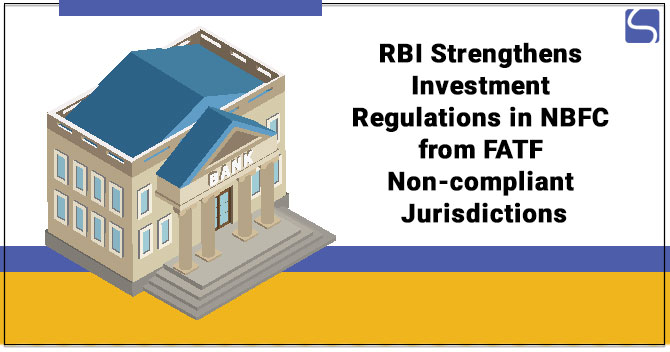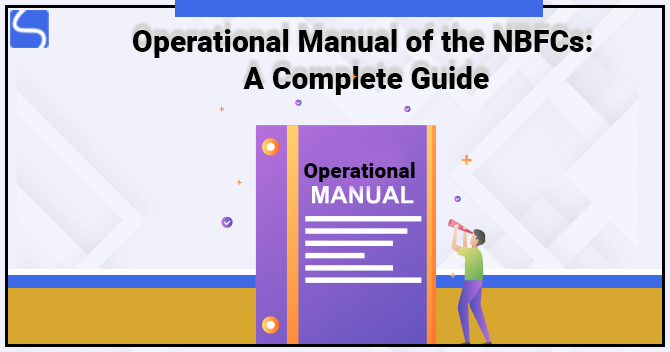RBI Strengthens Investment Regulations in NBFC from FATF Non-compliant Jurisdictions

Karan Singh | Updated: Jun 16, 2021 | Category: NBFC
Currently, the RBI (Reserve Bank of India) issues a notification to impose restrictions on investments in NBFCs (Non-Banking Financial Companies) by investors from the FATF non-compliant jurisdictions. Such restrictions were already applicable from the 12th of Feb 2021. In this blog, we will be talking about the details of the notification released by the Reserve Bank of India to Strengthens Investment Regulations in NBFC from FATF Non-compliant Jurisdictions.
Table of Contents
Background Matter – Investment Regulations in NBFC from FATF Non-compliant Jurisdictions
The restrictions have come in the awaken of increased inspection of the Non-Banking Financial Companies after the fall down of certain companies & also to restrict money laundering. The RBI had commenced investigating from Mauritius since last year and returned numerous applications by different Non-Banking Financial Companies because of their connection with Mauritius. This was because of the fact that Mauritius was punt under the grey list by the FATF (Financial Action Task Force) in the year 2020 due to certain organised deficiencies. Such organised deficiencies comprise lack of access to correct beneficial proprietorship information by the experienced authorities, lack of potential to prevent money laundering, and failure to conduct financial investigations.
Such steps from the Reserve Bank of India[1] caused a lack of lucidity for the fund managers. They were confused regarding whether to consider Mauritius while setting fund structures and working with the present legacy structures. But, with the notification or circular from the RBI, the confusion has been put to rest.
Meaning of Financial Action Task Force
It is a worldwide watchdog organisation that looks to restrain money laundering & terrorist financing. It was established in the year 1989, and today it is an intergovernmental organisation with thirty-nine members and affiliations from CFATF, APG, etc. The FATF (Financial Action Task Force) has developed the standards or recommendations of FATF, which make sure a co-ordinated response globally to prevent organised crimes & terrorism. It has also been working to prevent funding for weapons of mass destruction.
FATF fights terrorism financing & money laundering, which regularly recognises jurisdictions that have fragile measures to fight terrorist financing and money laundering under two headers:
- High-risk jurisdictions subject to a call for action, including of Democratic People’s Republic of Korea & Iran;
- Jurisdiction under increased observing, including of countries such as Myanmar, Jamaica, Ghana, Mauritius, and Cambodia.
Notification of RBI on Investment Regulation in NBFC from FATF Non-Compliant Jurisdictions
The circular/notification of the Reserve Bank of India distinguishes the investment based on the pre-existing and new investors and delivers various rules for both classes, and the restrictions imposed via this notification or circular apply to the new investors only.
New Investors
New investors through or from the FATF non-compliant jurisdictions would be prohibited from indirectly or directly getting considerable influence in the present investee NBFC and companies looking for NBFC Registration Certificate. The word significant impact is mentioned as having more than 20% of the actual as well as possible voting power. This prohibits new investors from the FATF non-compliant jurisdictions from getting beyond 20% of the voting rights in the Non-Banking Financial Companies.
The Reserve Bank of India circular requires considering the aggregate of actual & possible voting power. The potential voting power comprises right on account of instruments that are convertible to equity other tools with delegation voting rights, etc.
Existing Investors
The restrictions under the circular of the Reserve Bank of India pertaining to restrictions on investments in NBFCs by investors from the FATF non-compliant jurisdictions shall not apply to the existing investments in Non-Banking Financial Companies from FATF non-compliant jurisdictions. They have also been allowed to obtain additional investment to support their continuity of business in India. But, it is worth mentioning here that such additional investment must be as per the extant regulations.
The permission for additional investment by existing investors looks to be not aligned with the notification’s objective. The existing investors are permitted freely to make an additional investment as per the extant regulation, and only fresh investors are subjected to a limitation of 20% of voting rights.
The notification may lead to practical problems in ensuring compliance by listed Non-Banking Financial Companies, and a particular mechanism could well be needed to be developed to help the same. The listed Non-Banking Financial Companies should be watchful of the investment by already registered Foreign Portfolio Investors (FPI) from jurisdictions that were categorised as FATF non-compliant. Such Foreign Portfolio Investors (FPIs) could invest up to the sectoral limit of 100% in Non-Banking Financial Company, thereby breaching the limit arranged under the circular/notification.
Conclusion
In 2020, the Reserve Bank of India had returned a few applications from the private equity & venture capital funds in Mauritius for Greenfield investments or acquisitions of NBFCs on account of its FATF compliance status. The circular/notification of the Reserve Bank of India (restrictions on investments in NBFCs by investors from the FATF non-compliant jurisdictions) clarifies the position of law and sets out the limitations, allows non-controlling investments and exempts present investment, comprising extra investment in Non-Banking Financial Companies to support continuity of business in India. This clarity by the RBI concerning the restrictions is expected to benefit investors in structuring their entry in India, especially in the Financial Services Sector.
Read our article:Fintech Startups Striving to Get NBFC License Despite Numerous Challenges















